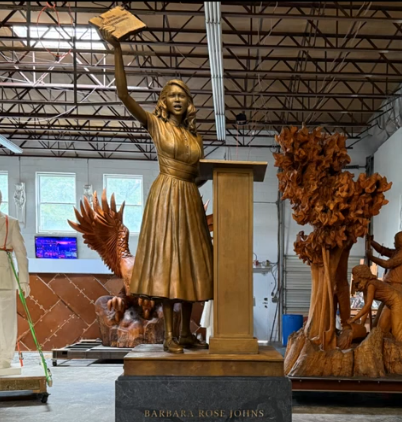‘How Not to Drown’: Dos Passos Prize recipient tells her own story
Published 6:56 pm Saturday, April 12, 2025
|
Getting your Trinity Audio player ready...
|
This past Wednesday, April 9, novelist and editor Angie Cruz paid a visit to Farmville to receive the 43rd John Dos Passos Prize for Literature, an award given annually by Longwood University to an American author whose work merits further recognition.
The literary prize is named in honor of novelist John Dos Passos, “one of the greatest—and most often ignored—writers of the twentieth century.” Each year, the prize jury selects an author whose work explores American themes, experiments with form, and displays a range of human experiences.
“For Longwood University to recognize my work, which centers on Dominican immigrants, it feels deeply meaningful and in line with what I care about,” the New York City-born Cruz said. “It’s an affirmation that these stories matter, that they belong in literature, and that they are, in fact, part of the American experience.”
To date, Cruz is the first Dominican American author to receive the Dos Passos Prize. Her 2019 novel, “Dominicana,” was the inaugural book pick for the GMA book club and shortlisted for The Women’s Prize. Her most recent novel, “How Not to Drown in a Glass of Water,” was a finalist for the 2024 Neustadt International Prize for Literature and selected for The New York Times 100 Notable Books of 2022.
More about the Dos Passos Prize winner
Last year, Cruz published her first children’s book. “When I was growing up, I didn’t see many books that reflected my world, my culture, my family’s traditions,” she said. “Writing ‘Angélica and la Güira’ was a way of offering young readers a story where they can see themselves, where they can hear their language, their music and their history honored.”
In “Angélica and la Güira,” Angélica returns to New York after spending her summer in the Dominican Republic, where her grandfather gave her the gift of a güira—a percussion instrument that is sure to make people dance. Back in Washington Heights, Angélica plays her güira and dances in the street, sharing the power of music with her community.
“Representation matters—not just in literature for adults, but from the very beginning, when children are forming their understanding of the world,” said Cruz. “And if just one kid sees themselves in Angélica and la Güira and feels proud of their culture but also feels empowered to use their voice, then that makes all the work worth it.”
In addition to writing, Cruz is the co-founder and editor of the transnational, feminist literary arts journal, “Aster(ix),” which is free to read online.
Cruz said, “Right now, more than ever, we need to be reading the works by and about immigrants, books that tell stories of Black and brown communities, of Indigenous writers, queer and trans storytellers, of people who are directly impacted by the policies and injustices shaping this country.”
Detailing her work
Cruz’s storytelling goes beyond her writing. In 2019, she started an archive on Instagram, @dominicanasnyc, that captures the everyday lives of Dominican women in New York City from the 1950s to the 1990s.
“Each mode of storytelling allows me to get closer to the heart of what I want to say: that our lives are complicated, full of contradictions, and worthy of being told in all the ways they exist,” explained Cruz. “Storytelling is survival. It’s a way to remember, to resist, to dream. It’s how we make sense of the world and our place in it.”
“I write because I come from a lineage of storytellers,” Cruz said. “My mother, my tías, my abuela—they told stories all the time, sometimes to teach a lesson, sometimes just to make us laugh. I carry that tradition with me in my work.”
Cruz’s novels often feature the parallel lives of women living in Washington Heights, the largest Dominican neighborhood in New York City. Her first book, “Soledad,” is told through the voices of several women from the same family, bridging generational gaps and providing different perspectives. Cruz’s novel, “Dominicana,” was inspired by her mother’s arrival story.
“Literature allows us to connect across time and space, to build bridges between experiences. That’s what storytelling is to me—it’s a way of making sure we see each other, really see each other, and recognize our shared humanity,” she said.
Editor’s note: Jordan McPherson wrote this for the Farmville Herald.






